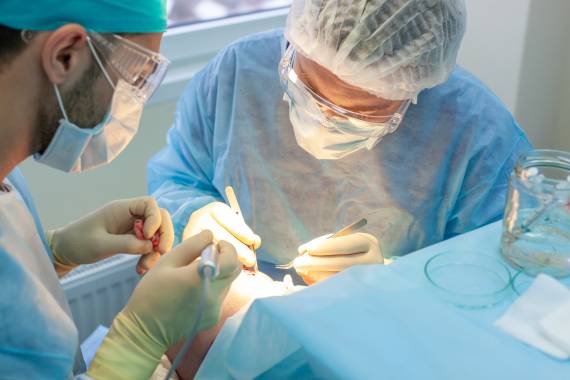Making Informed Choices About Hair Transplant Surgery
Deciding to undergo a hair transplant is more than just a cosmetic choice. It is a deeply personal journey toward confidence. At IHRS in Jacksonville, Florida, we are committed to helping you ask the right questions so you feel fully informed and supported every step of the way. Here is a clear guide to the most essential questions you should ask during your consultation with our transplant specialists.
1. Will the surgeon I meet at consultation be the same person performing the procedure?
Consistency matters. You will want your consultation surgeon to be the same professional who performs your procedure. This ensures they fully understand your hair loss pattern and goals and avoids surprises. Continuity contributes to better outcomes and greater trust.

2. What qualifications, training, and certifications does your surgical team hold?
Look for credentials like board certifications in dermatology or plastic surgery, membership in the International Society of Hair Restoration Surgery (ISHRS), or affiliations with accredited medical institutions. It is also important to know if your surgeon is experienced not just technically but also artistically, especially when designing a natural hairline (ISHRS).
3. Which transplant technique is right for me: FUE or FUT?
Understanding the difference is key:
- FUE (Follicular Unit Extraction): Individual follicular units are harvested using tiny punches, leaving minimal scarring and offering faster recovery.
- FUT (Follicular Unit Transplantation or strip method): Involves removing a strip of scalp, dissecting it into grafts, and transplanting them. It enables a higher graft yield in one session but leaves a linear scar.
Ask why the surgeon recommends a particular method for your hair type, scalp laxity, and aesthetic goals (Cleveland Clinic).
4. How many grafts will I need and what will it cost?
The number of grafts depends on the extent of your hair loss, your hair type (fine, coarse, curly, straight), and desired density. More important than low cost per graft is the skill behind the placement. Better results come from thoughtful artistry, not just numbers.
5. Can I see before-and-after photos and speak with past patients?
Visual proof is powerful. Ask for images of patients with hair loss patterns and skin types similar to yours. Also, seeing testimonials or speaking to former patients can provide real-world insight into the clinic’s results and care.
6. What kind of results are realistic for me and what is the timeline?
A well-qualified surgeon will show you achievable expectations, possibly referencing the Norwood scale for comparison. Final results often emerge between six to twelve months post-surgery, although some early growth appears before then (Mayo Clinic).
7. Are there risks or complications I should know about and what happens if things do not go as planned?
No procedure is risk-free. Ask about:
- Common side effects like shock loss, scabbing, or swelling.
- Scar risks. FUE scarring is minimal, while FUT leaves a linear scar.
- Protocols for complications. Reputable clinics will have documented responses if something unexpected occurs.
8. Will you consider my hair type and future hair loss in planning?
Different hair textures and colors require specialized approaches. For example:
- Coarse vs. fine
- Curly vs. straight
- High contrast between hair and skin
These factors impact graft number and placement strategy. Additionally, be sure your surgeon plans for long-term sustainability by avoiding overharvesting and leaving options open for future sessions.
9. Will I need medication or maintenance treatments after the transplant?
Some clinics recommend adjunctive treatments such as Minoxidil or Finasteride to preserve existing hair and enhance results. Understanding post-op care, from medications to lifestyle changes, can make a significant difference.
10. Where will the procedure take place and who else will be involved?
Ask if the facility is accredited and if the surgeon has hospital privileges or works in a certified surgical center. Know who will assist during the procedure and confirm their training and licensing.
11. Am I an ideal candidate? Is it too early or too late for a transplant?
Age and stability of hair loss matter. Getting a transplant too young or before hair loss stabilizes could lead to suboptimal outcomes or necessitate multiple procedures later. Good candidates typically have moderate hair loss, sufficient donor hair, and realistic expectations.
12. What is your experience in achieving natural-looking results?
Hair transplantation is as much art as science. A thoughtful surgeon plans hairlines that suit your face, age, and donor supply rather than restoring a previous youthful hairline inappropriately. Past patient images should reflect natural, personalized outcomes.
13. What if I am unhappy with the results?
Clarify if the clinic offers corrective procedures, touch-ups, or guarantees. Addressing dissatisfaction should be part of the treatment plan.
Empowering Your Decision with the Right Information
At IHRS in Jacksonville, your confidence and peace of mind are our top priorities. These questions help ensure your consultation is meaningful, personalized, and thorough. We believe in open dialogue, transparency, and crafting results that look and feel uniquely you.
Are you ready to book a consultation? We would love to help you take that first step toward restored confidence right here in Jacksonville, Florida.
References
- Mayo Clinic – Hair transplant: What you can expect
- Cleveland Clinic – Hair Transplant Surgery Overview
- ISHRS – Questions to Ask Your Hair Doctor
